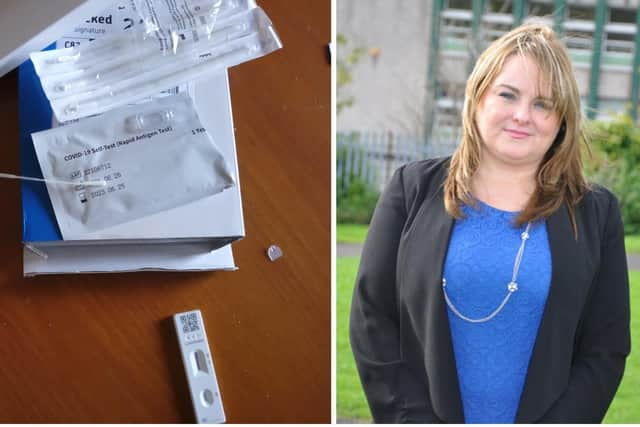Potential end to free COVID PCR and lateral flow tests ‘must not impact here’ - Derry Colr.
and live on Freeview channel 276
The party’s local health spokesperson claimed Boris Johnson’s plans to end free Covid-19 testing in England were “irresponsible and must not impact on testing here”.
Colr. Duffy was speaking after the Tory UK Prime Minister this week announced his government’s plans for ‘living with COVID’ in England.
Advertisement
Hide AdAdvertisement
Hide AdThe Department of Health in the north is currently assessing whether to change testing and tracing provision here following the plans for England.


A statement from 10 Downing Street said that in England, the number of cases, hospitalisations and deaths “continue to decline and are far below the levels of previous waves, with boosters offering strong protection against severe illness and hospitalisation”.
It adds: “The Prime Minister has been clear that restrictions would not stay in place a day longer than necessary. The British public have made extraordinary sacrifices during the 2020 lockdowns, the Roadmap, and recent Plan B measures in response to the Omicron variant.”
Boris Johnson confirmed domestic legal restrictions in England will end tomorrow, Thursday February 24 “as we begin to treat Covid as other infectious diseases such as flu”.
Advertisement
Hide AdAdvertisement
Hide AdAs such domestic restrictions in England will be removed, the legal requirement to self-isolate ends, self-isolation support payments, national funding for practical support and the medicine delivery service will no longer be available, routine contact tracing ends, and universal free provision of tests “will end as our response to the virus changes”.
“From the start of April, the government will end free symptomatic and asymptomatic testing for the general public. Limited symptomatic testing will be available for a small number of at-risk groups and we will set out further details on which groups will be eligible shortly. Free symptomatic testing will also remain available to social care staff. We are working with retailers to ensure that everyone who wants to can buy a test.”
Colr. Duffy claimed that the decision to end free testing was “in line with the reckless approach adopted by the Tories throughout the pandemic”.
“It is important that at this point in the pandemic we maintain protections from the virus, particularly for the most vulnerable in our communities,” she said.
Advertisement
Hide AdAdvertisement
Hide Ad“Ending free testing and putting the costs on ordinary people who are already struggling with a cost-of-living crisis will act as a deterrent to people getting tested and could see an increase in the spread of the virus.
“It’s crucial that we take independent, considered and sensible decisions so that we can safely reopen society for everyone.
“At the Assembly we have asked the Chief Medical Officer and Chief Scientific Officer to come before the health committee to set out their views on testing and the safest exit from the pandemic.”
The Department of Health in the north is currently assessing whether to change testing and tracing provision here.
Advertisement
Hide AdAdvertisement
Hide AdNo decisions have been taken on any changes to Test and Trace in Northern Ireland.
Health Minister Robin Swann said: “My Department continues to keep all aspects of the COVID-19 test and trace programme in Northern Ireland under review to ensure it remains proportionate and effective.
“Our key priorities for testing include ensuring that it is prioritised for those who need it most. It is also imperative that we have appropriate contingency planning in place, with flexible testing capability which can be rapidly deployed to respond to any future variants or seasonal surges. Robust surveillance systems must also be maintained, to ensure any new developments in the pandemic are swiftly detected.
“Keeping the public safe, in particular those at highest risk of severe illness, will continue to be at the centre of our considerations. Any policy changes will be informed by the latest clinical and scientific advice and consideration of the COVID situation in Northern Ireland.”
Advertisement
Hide AdAdvertisement
Hide AdThe Minister also highlighted the importance of a cautious approach due to the continuing high numbers of daily infections and the continued pressure on hospitals.
He said: “COVID-19 remains a serious health risk, particularly for those who are vulnerable. It is vital that we do not let our guard down. We can all help to keep the people close to us safe by continuing to make safer choices and following the latest guidance.”
The current guidance to reduce the spread of COVID-19 includes:
Getting vaccinated and boosted
Wearing face coverings in health and social care settings, on public transport and in enclosed indoor settings
Advertisement
Hide AdAdvertisement
Hide AdMeeting outdoors where possible or in well ventilated indoor spaces
Taking a PCR test and self-isolating immediately if you have symptoms
Taking a lateral flow test before mixing with others, particularly vulnerable people